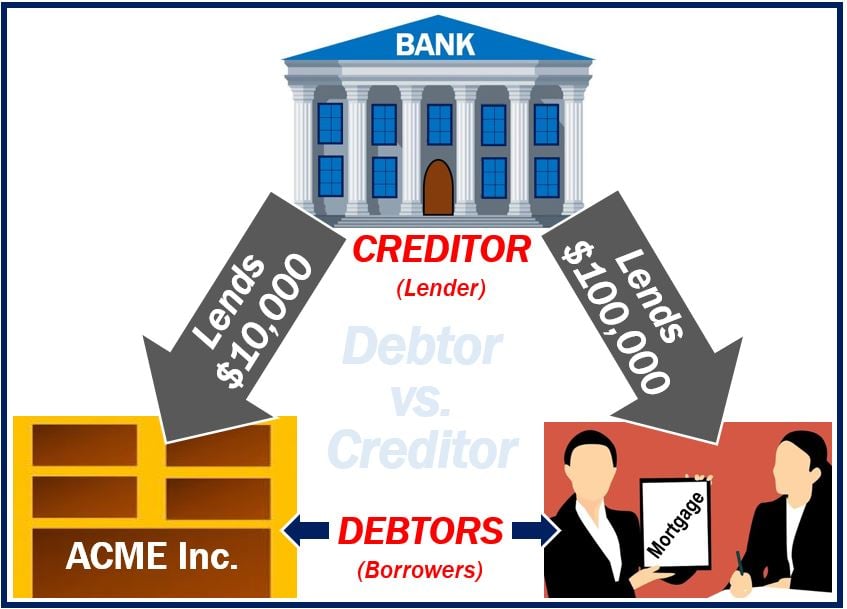If you owe money, you are a Debtor. A debtor is a person, company, organization, country, or any entity that owes money. Debtors have a legal obligation to pay back what they owe.
Debtors can range from individuals taking personal loans to nations incurring international debts.
If ACME Inc. borrowed $50,000 from its bank, it is a debtor. We refer to the lender as the creditor.
Wikipedia has the following definition of the term:
“A debtor is an entity that owes a debt to another entity. The entity may be an individual, a firm, a government, a company or other legal person. The counterparty is called a creditor.”
“When the counterpart of this debt arrangement is a bank, the debtor is more often referred to as a borrower.”

Etymology of debtor
Etymology is the study of where words come from, i.e., their origins, as well as how their meanings have evolved over time.
In twelfth-century England, the word Dettur and Dettour emerged, with the meaning “one who owes or is indebted to another for money, services, or goods.”
It came from the Anglo-French word Detour and the Old French word Detor, which came directly from Debitor, meaning “debtor.”
Between about 1560 and 1660, the spelling of the word became Debtor.
Borrower and issuer
Both terms, borrower and issuer, can mean an entity that owes money. However, we use them in different situations
-
Borrower
If my bank grants me a loan, I am the borrower and the bank is the creditor. Any arrangement where a loan is involved has a borrower and creditor.
-
Issuer
When governments or large corporations want to borrow money, they may issue bonds. Investment firms, pension funds, and other investors including individuals buy the bonds. In this case, we call the lenders bondholders and borrowers issuers.
Bonds are super-secure investments which earn interest.
Trade debtors
If I supply ACME Furniture Inc. with, for example, wood, I will send them an invoice with the delivery. The invoice may include the following phrase: “Payment Terms: 30 days from date of invoice.”
This means that ACME can pay me after thirty days. During that period, ACME owes me money – it is a trade debtor and I am a creditor.
It is common to drop the word ‘trade’ and simply refer to ACME as a debtor.
Suppliers will first check out the creditworthiness of a buyer before offering credit terms. Creditworthiness refers to an entity’s ability to pay back a debt on time. If you are a good debtor, i.e., you pay what you owe on time and in full, you are creditworthy. If you have defaulted on a debt, i.e., never paid it back, you are not seen as creditworthy.
In some cases, my debtor might also be my creditor. For example, let’s suppose I deliver wood to ACME Furniture Inc. on the same day that it delivers a table to my company. We both offer each other 30-day payment terms.
As far as the wood purchase is concerned, I am the creditor and ACME is the debtor. But ACME is my creditor and I am the debtor regarding the table purchase. This mutual credit relationship is known as ‘contra’ in accounting terms.
Debtor vocabulary and concepts
There are many compound nouns in the English language that contain the word “debtor.” A compound noun is a term that consists of two or more words. Let’s take a look at some such terms, their meanings, and how we can use them in a sentence:
-
Debtor Nation
A country that owes more money to other countries than it is owed.
Example: “During the economic downturn, the country’s status shifted to a debtor nation due to its mounting international debts.”
-
Debtor Company
A business entity that has taken on debt and is obligated to repay it.
Example: “The debtor company worked diligently to restructure its finances and pay back its creditors.”
-
Debtor Account
An account on a company’s financial statement that represents the money owed to the company by its customers.
Example: “Our financial team is closely monitoring the debtor account to ensure timely collections.”
-
Debtor Ledger
A ledger that contains the records of transactions involving credit sales to customers.
Example: “The bookkeeper regularly reconciles the debtor ledger to maintain accurate financial records.”
-
Debtor Management
The process of overseeing and collecting payments from customers or clients who owe money to an entity.
Example: “Debtor management is a key component in improving the business’s liquidity.”
-
Debtor List
A list or record of individuals or organizations that owe a particular debt or several debts.
Example: “The collections department reviews the debtor list weekly to follow up on overdue payments.”
-
Debtor Aging
A report that categorizes a company’s accounts receivable according to the length of time an invoice has been outstanding.
Example: “The debtor aging report indicated several accounts that were over 90 days past due, signaling a potential risk.”
Video – What is a Debtor?
This video, from Marketing Business Network, our sister channel on YouTube, explains what ‘Debtor’ is using easy-to-understand language and examples.
